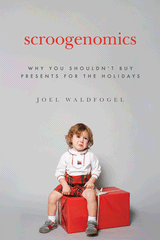Kan presentkort minska the deadweightloss of christmas?
 10 jan 2011, kl 8:47
10 jan 2011, kl 8:47 Det är ofta att skoj att spåna på titlar till flygplatsböcker. Vid senaste USA-resan noterades att det säljs presentkort i massor, även på lite oväntade ting. Exempelvis kan man köpa ett giftcard för 55 dollar, som ger mottagaren ett visakort med 50 dollar att handla för. Finns naturligtvis även som Mastercard.
Vad är poängen? Pja, eftersom det inte är socialt accepterat att ge bort kontanter, och vanliga presenter är förknippade med betydande transaktionskostnader och effektivitetsförluster, är folk uppenbarligen villiga att betala 55 dollar för att kunna ge bort 50 dollar.
Flygplatsbokens namn skulle kunna bli något i stil med "The Giftcard Society - How our fear of cash and intimacy is changing america. Men är det en önskvärd trend?
Intressant nog visade det sig att en snarlik bok redan är skriven, och den är ganska positiv till presentkort:
Scroogenomics: Why You Shouldn’t Buy Presents for the Holidays. By Joel Waldfogel.Princeton University Press, 2009.

Boken är naturligtvis en remake på Waldfogel, Joel. 1993. “The Deadweight Loss of Christmas.” American Economic Review, 83(5)
Av recensionen i JEL: (skriven av Joseph Price) framgår att W. också tar upp gåvornas fördelar:
Waldfogel also notes other situations in which gifts may create value. The first is the paternalistic reason where recipients are not perfect decisionmakers (i.e., a winter hat). The second are situations where the recipient has imperfect information (i.e., the CD for a band they would love but have never heard of). The third is when the recipient needs permission to indulge in a particular item (i.e., a Blu-ray DVD player). All of these can be seen as market frictions for which gift giving may serve as a solution
Enligt Waldfogel är det ungefär 10 procent av presentkortens värde som inte utnyttjas av mottagaren, men detta är ingen samhällsekonomisk förlust eftersom det kommer presentkortsutfärdaren till del.
Bra gåvor kan således vara överlägsna presentkort, men presentkort är betydligt bättre än gåvor som mottagaren inte tycker om.

Reader Comments